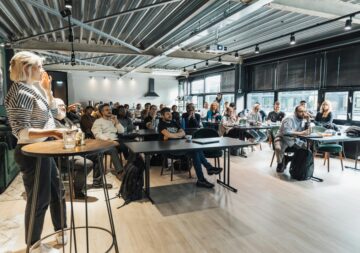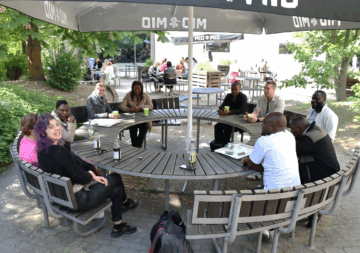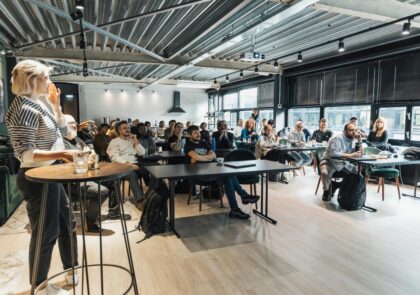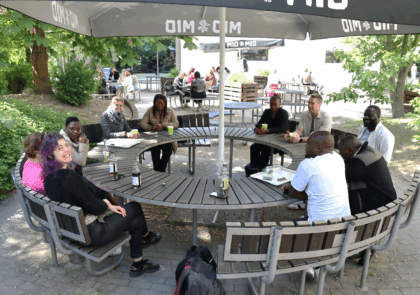
Work-based immigration is more active than ever. Finland competes with the rest of the world for a competent and skilled workforce that would help to improve economic challenges, balance the national maintenance, and help to gain new skills and know-how. In the Lahti region, the companies have different basis and capabilities for hiring international experts. More active and distinctive regional marketing efforts together with the public sector would help the companies reach and attract right experts around the world.
Anri Vuori & Brett Fifield
Like other growing economies, Finland also has concerns about the sufficiency of the skilled workforce in various fields. A sufficient workforce provides the companies resources they need for growth and maintaining competence. The number of working-age people in Finland is decreasing, and population growth occurs exclusively through immigration. (Työ- ja elinkeinoministeriö.)
International recruitments are known for their bureaucratic and regulated processes for companies, limiting companies access to the international workforce. This is partly due to immigration and integration policies in European and also in Finland aiming simultaneously to limit and increase immigration to ensure safe and regulated moving flows.
Work-based immigration is significant for obtaining and gaining high-level competitiveness
The Finnish immigration policy emphasizes increasing work-based immigration and international talent attraction, both aiming to solve the skill and labor shortage caused by the slow population growth. During the 2020s the government aims to double the work-based immigration and accelerating from there to 10,000 arrivals per year (Valtioneuvosto, 2021.) National development programs, such as the Talent Boost program, help the private sector to reach and attract international employees, students and researchers, and help them to adapt and integrate to Finnish work life (Työ- ja elinkeinoministeriö). Locally, the TalentHub project implemented in the Lahti Region, is an excellent example of a local and agile action program aiming to promote the availability of international labor for the needs of companies (Lahden kaupunki.)
After arriving, the immigrants should be provided a barrier-free access to labor services and education which can help them reach higher income levels, increase social well-being, and help them start their personal career planning and professional development path. (Lehtovaara, H. 2022). Although the economic benefits of work-based immigration are undeniable, Finnish workplaces have a lot to do before the culturally diverse community is seen as a competitive factor on its own.
Multicultural personnel can promote company competitiveness and attract new talents
The lack of personnel and talents is a challenge for companies seeking growth and internationalization. In addition to enough personnel, international experts bring new competitiveness factors to the company, such as new ways of thinking, acting, and solving problems, which increases creativity, diversifies operations, and creates equality. Cultural diversity promotes innovation by creating an environment that allows out of the box -thinking (Hewlett et al. 2013.) People with different starting points and cultural inheritances complement each other.
An inclusive work culture increases the commitment of the personnel when all kinds of people feel welcome and valued at the workplace. The cultural diversity of the work community also attracts diverse clientele and more international experts, so it is also an economically motivating organizational structure. Companies with a highly ethnic and diverse representation can achieve up to 33-35% better financial results than their competitors (Hunt et al. 2018.) Even though the positive effects of cultural diversity are undeniable, in many Finnish companies the implementations of cultural diversification are still small-scale. The employment of international experts in Finland is slowed down by both language problems and the fear of a clash of cultures. Finnish society has traditionally been homogeneous, and no culture changes in an instant.
Strategic partnership in recruitments and an inclusive working environment can help find the right international talents
Vuori´s (2022) thesis examined the experiences of hiring and engaging international talents in the Lahti Region-based companies, the effects of cultural diversity in these working communities, and how the attractiveness of the Lahti Region could be increased to make the region more attractive in the eyes of international experts. According to the results, international recruitment processes were perceived as difficult and bureaucratic among those companies that didn´t use external recruitment help. Some companies had experienced international recruitment as ineffective and time-consuming without a professional recruiter, especially when they were searching for niche expertise in global labor markets. The more continuous and strategic the cooperation between the employer and recruiter became, the more successful recruitments the companies seem to make. External recruiters, such as personnel and staffing companies, can help companies tackle the shortage of expertise by finding the right international talents easier and faster due to their extensive networks.
Employers also have different know-how and capacity to participate in the integration process or point these services to their families. The formation of a sense of social belonging is decisive for the immigrant’s stay and the starting point for successful integration. An employer can help create an inclusive working environment by encouraging more open and culturally aware company culture, encouraging for social networking during and outside the work, and engaging the right people in the onboarding process.
Finland´s country image with working life equalities and opportunities for self-development are trump cards in attracting international talents to Finland. More locally, Lahti’s excellent logistic location in Southern Finland, interesting company coverage, cooperation between business life and educational units, and the possibilities to combine work-life and free time as well as the nature and recreational areas, were brought up as talent attraction factors in the Lahti Region. Alone, they are still not enough to bring enough international experts to the region and companies acquire for more internationally targeted regional marketing materials and more clearer differentiation factors to make the region more known.
In the future, the Lahti Region companies are expected to have their share of the accelerating flow of work-based immigrants, which encourages all companies’ to asses how open they truly are for cultural diversity changes. A path towards more culturally inclusive environment can start with increasing the awareness of multiculturalism and its advantages among the personnel and becoming familiar with diversity management models.
References
Hewlett, S-A. Marshall, M & Sherbin, L. 2013. How Diversity Can Drive Innovation. Harward Business Review magazine on December 2013. Cited 19 July 2022. Available at https://hbr.org/2013/12/how-diversity-can-drive-innovation
Hunt, V., Dixon-Fyle, S., Prince, S. & Yee, L. 2018. Delivering through diversity. McKinsey & company report on 18 January 2018. Cited 18 July 2022. Available at https://www.mckinsey.com/business-functions/people-and-organizational-performance/our-insights/delivering-through-diversity
Lahden kaupunki. Lahti TalentHub. Cited 21 July 2022. Available at https://www.lahti.fi/kaupunki-ja-paatoksenteko/lahti-talenthub/
Lehtovaara, H. 2022. Maahanmuuttaneiden naistentyöllistymisen esteitä. Migration – Muuttoliike-magazine. Vol 48(1), 14-17. Cited 20 July 2022. Available at https://siirtolaisuus-migration.journal.fi/article/view/120002
Työ- ja elinkeinoministeriö. Talent Boost -toimenpideohjelma. Cited 20 July 2022. Available at https://tem.fi/talent-boost
Valtioneuvosto, 2021. Government roadmap compiles measures to increase education-based and work-based immigration. Ministry of Economic Affairs and Employment. Cited 11 July 2022. Available at https://valtioneuvosto.fi/-/1410877/hallituksen-tiekartta-kokoaa-toimet-koulutus-ja-tyoperustaisen-maahanmuuton-lisaamiseksi?languageId=en_US
Vuori, A. 2022. Cultural diversity among the personnel as a competitive advantage and a strategic choice to combat the shortage of expertise – International recruitment practices shared by the companies from the Lahti Region. Master´s thesis. LAB University of Applied Sciences, Faculty of Business. Lahti. Cited 22 July 2022. Available at https://urn.fi/URN:NBN:fi:amk-2022090319812
Authors
Anri Vuori is a Master’s Student in the Faculty of Business at Lab University of Applied Sciences.
Brett Fifield is a Principal Lecturer in the Faculty of Business at Lab University of Applied Sciences.
Illustration: https://pxhere.com/en/photo/1652042 (CC0)
Published 26.9.2022
Reference to this article
Vuori, A. & Fifield, B. 2022. Capabilities in hiring and engaging international talents can help tackle the shortage of expertise. LAB Pro. Cited and date of citation. Available at https://www.labopen.fi/en/lab-pro/capabilities-in-hiring-and-engaging-international-talents-can-help-tackle-the-shortage-of-expertise/






